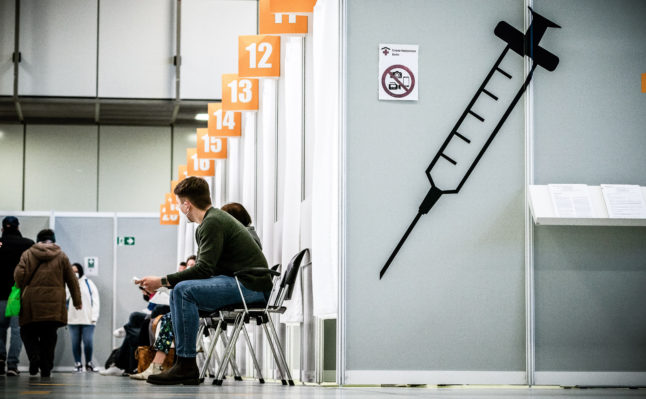Priority group 3 includes anyone over the age of 60, as well as anyone working in “particularly relevant positions.”
Germany’s northernmost state of Schleswig-Holstein will also open up vaccination appointments for this group starting on Thursday May 6th. Most other states are still vaccinating priority group 2, but will begin giving out appointments for the third group in the coming weeks.
Priority group 2 includes people aged 70-79, people with serious pre-existing conditions, as well as primary school teachers, riot police and two designated contacts of pregnant women.
READ ALSO: EXPLAINED: How do I prove that I belong to one of Germany’s vaccine priority groups?
Vaccinations in Baden-Württemberg
As of Monday morning, anyone over the age of 60, those with pre-existing conditions and up to two contact people of those in need of care can be vaccinated in the southwestern state of Baden-Württemberg.
Anyone with the following pre-existing conditions qualifies for the vaccine: treatment-free cancer, HIV, rheumatic and autoimmune diseases, heart disease, asthma and obesity.
READ ALSO: When will I be in line for a Covid-19 vaccination in Germany?
But, unlike in Berlin, “people in relevant occupational groups still have to be patient. The opening of this group is expected, depending on the vaccine deliveries, around mid-May,” said social minister Manne Lucha of the Greens in a press release.
This further opening step makes around 1.5 million more people eligible for a jab, according to Lucha.
A certificate from the attending physician serves as proof of vaccination eligibility.
For the contact persons of people in need of care, a template for self-certification was put online on the homepage of the social affairs ministry on Monday morning.
Vaccinations in Berlin
Vaccinations opened up at 7am on Monday, and the capital’s telephone hotline (030 90 2822 00) was partly overloaded due to the high volume of calls. Many people were asked to try again later.
Via the city website or Doctolib, appointments for a vaccine with US manufacturer Moderna could be booked in some of Berlin’s six vaccination centers starting in mid-May.
In other vaccination centres, such as the Arena in Treptow or the Messehalle in Charlottenburg, where only Biontech/Pfizer is offered, there were longer waiting times for appointments.
Berlin is one of four German states who have dropped the priority list and opened up vaccines with AstraZeneca to all adults who have a consultation with a doctor. It is, however, officially only recommended to those over the age of 60.
READ ALSO: These are Berlin’s GPs vaccinating non-registered patients with AstraZeneca
“The vaccination campaign in Berlin will be further advanced with the opening of prioritisation group three,” said state senator Dilek Kalayci on Friday.
“It’s good that we can now also invite the over-60s and, above all, make an offer of vaccination to those who work in crucial positions for our community.”
Here’s a breakdown of who qualifies for the vaccine in Berlin:
– Anyone in Berlin 60 years or older. They can now be vaccinated by their family doctor, book an appointment online, or set up an appointment for one of the six Berlin vaccination centres.
– Anyone at risk of a severe or fatal course of infection from the virus.
– Up to two contacts of anyone in need of care.
– Election workers who have a special certificate from their employer.
– People in “particularly relevant positions” in critical infrastructure facilities and companies should be vaccinated in a few weeks by company doctors. Journalists with a press card or certificate are also able to be vaccinated.
– Persons working in medical facilities for children and young people, and in the food trade.
– Teachers and other service personnel at secondary and vocational schools. The approximately 50,000 employees can book a vaccination appointment immediately. They will be informed about the details through a letter from the Senate Education Administration.
– Employees of the Berlin administrations are only eligible for vaccination if they hold a particularly relevant position, which is estimated to be currently limited to 12 percent of employees. This is determined by the respective department head, who will issue a certificate workers can bring to their appointment.



 Please whitelist us to continue reading.
Please whitelist us to continue reading.
Member comments